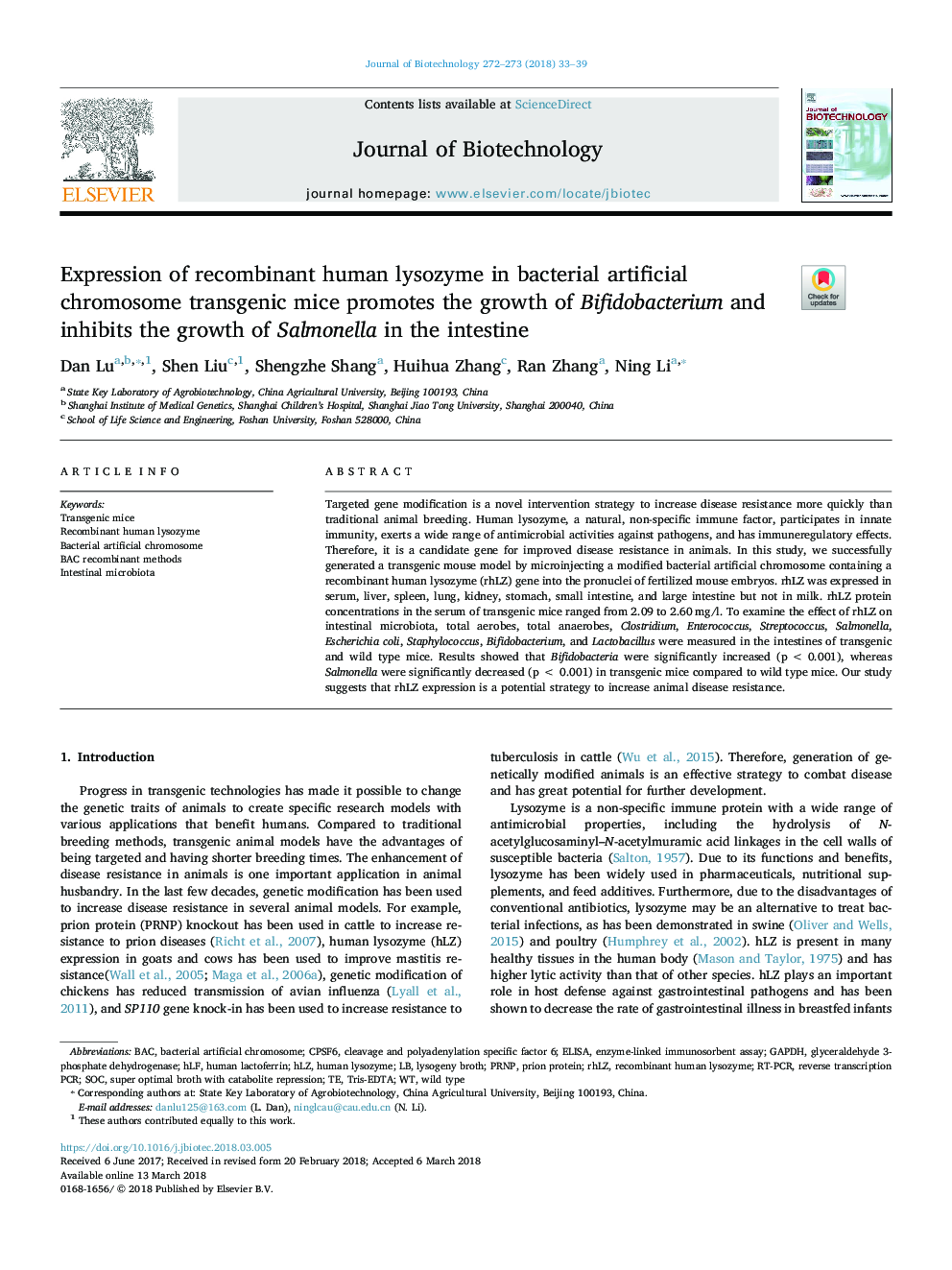| کد مقاله | کد نشریه | سال انتشار | مقاله انگلیسی | نسخه تمام متن |
|---|---|---|---|---|
| 6490334 | 1416971 | 2018 | 7 صفحه PDF | دانلود رایگان |
عنوان انگلیسی مقاله ISI
Expression of recombinant human lysozyme in bacterial artificial chromosome transgenic mice promotes the growth of Bifidobacterium and inhibits the growth of Salmonella in the intestine
دانلود مقاله + سفارش ترجمه
دانلود مقاله ISI انگلیسی
رایگان برای ایرانیان
کلمات کلیدی
Recombinant human lysozymeGAPDHPRNPRT-PCRCPSF6hLFBAC - LACTris-EDTA - تریس-EDTAEnzyme-linked immunosorbent assay - تست الیزاELISA - تست الیزاreverse transcription PCR - رونویسی معکوس PCRSOC - سیستم روی یک تراشهHuman lactoferrin - لاکتوفرین انسانlysogeny broth - لیزوزومی گوگردHuman lysozyme - لیزوزیم انسانیTransgenic mice - موش ترانس ژنیکIntestinal microbiota - میکروبیای روده یا باکتری های روده ایwild type - نوع وحشیPrion protein - پروتئین پریونbacterial artificial chromosome - کروموزوم مصنوعی باکتریاییglyceraldehyde 3-phosphate dehydrogenase - گلیسرولیدید 3-فسفات دهیدروژناز
موضوعات مرتبط
مهندسی و علوم پایه
مهندسی شیمی
بیو مهندسی (مهندسی زیستی)
پیش نمایش صفحه اول مقاله

چکیده انگلیسی
Targeted gene modification is a novel intervention strategy to increase disease resistance more quickly than traditional animal breeding. Human lysozyme, a natural, non-specific immune factor, participates in innate immunity, exerts a wide range of antimicrobial activities against pathogens, and has immuneregulatory effects. Therefore, it is a candidate gene for improved disease resistance in animals. In this study, we successfully generated a transgenic mouse model by microinjecting a modified bacterial artificial chromosome containing a recombinant human lysozyme (rhLZ) gene into the pronuclei of fertilized mouse embryos. rhLZ was expressed in serum, liver, spleen, lung, kidney, stomach, small intestine, and large intestine but not in milk. rhLZ protein concentrations in the serum of transgenic mice ranged from 2.09 to 2.60â¯mg/l. To examine the effect of rhLZ on intestinal microbiota, total aerobes, total anaerobes, Clostridium, Enterococcus, Streptococcus, Salmonella, Escherichia coli, Staphylococcus, Bifidobacterium, and Lactobacillus were measured in the intestines of transgenic and wild type mice. Results showed that Bifidobacteria were significantly increased (pâ¯<â¯0.001), whereas Salmonella were significantly decreased (pâ¯<â¯0.001) in transgenic mice compared to wild type mice. Our study suggests that rhLZ expression is a potential strategy to increase animal disease resistance.
ناشر
Database: Elsevier - ScienceDirect (ساینس دایرکت)
Journal: Journal of Biotechnology - Volumes 272â273, 20 April 2018, Pages 33-39
Journal: Journal of Biotechnology - Volumes 272â273, 20 April 2018, Pages 33-39
نویسندگان
Dan Lu, Shen Liu, Shengzhe Shang, Huihua Zhang, Ran Zhang, Ning Li,